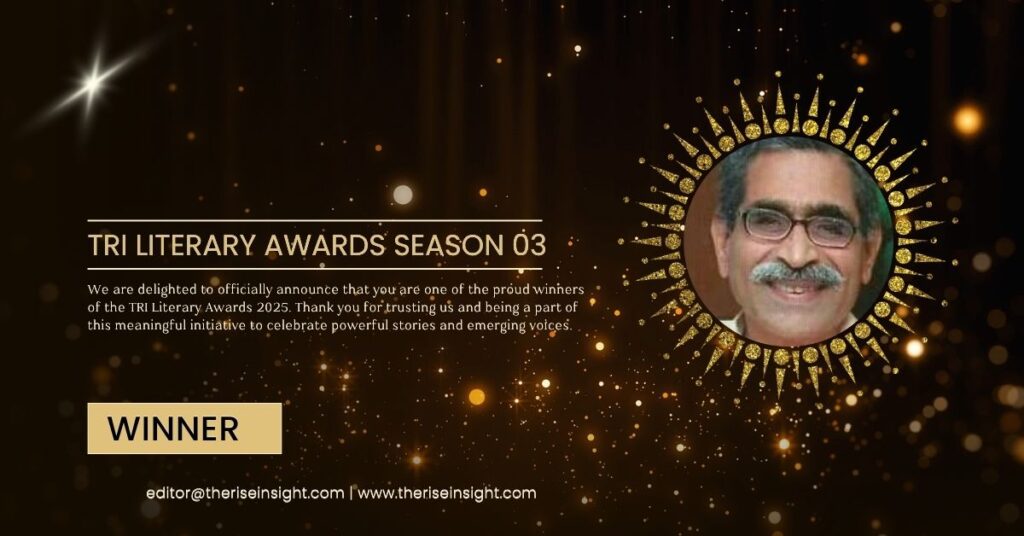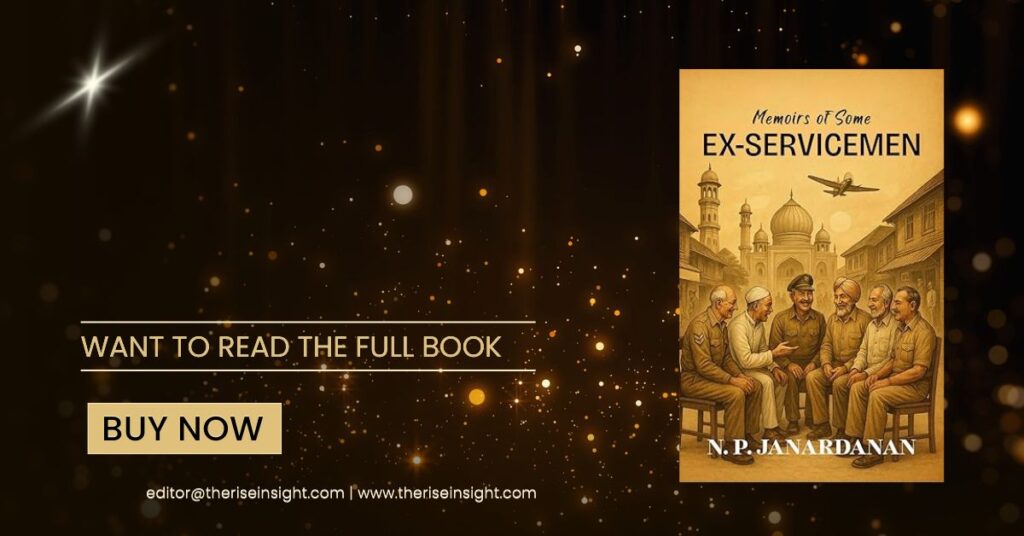
It is with great admiration and heartfelt respect that we extend our warmest congratulations to N. P. Janardanan for his well-deserved win at the TRI Literary Awards 2025 (Season 03). His book, Memoirs of Some Ex-Servicemen, has stood out as a rare gem in contemporary Indian literature—combining fact with fiction, memory with imagination, and patriotism with reflection. This recognition is not just a celebration of his literary work, but also a tribute to a life dedicated to service, storytelling, and truth.
A Literary Salute to the Stories That Time Couldn’t Erase
Reading Memoirs of Some Ex-Servicemen is like sitting in the circle of grand old war veterans and listening to their stories not merely with your ears, but with your heart wide open. This book is not just a collection of memories—it is a soulful documentation of a generation that lived, loved, served, and remembered in the quiet echoes of time. And what makes it more extraordinary is the lens through which it is presented: the 2020 COVID-19 lockdown, a time of forced stillness, used by these fictionalized veterans as a reflective pause to revisit their youth.
Set in the fictional city of Foujinagar, Janardanan creates a believable yet symbolic world where Air Force veterans, long retired, meet at a Club to exchange anecdotes. These men, now in their twilight years, are no longer warriors in uniform, but are still soldiers of memory and humor. In their words, we sense nostalgia, resilience, and a deep connection to a country they once served with unwavering loyalty. The housing colony they live in might be fictitious, but the conversations and camaraderie feel achingly real.
Janardanan’s brilliance lies in his ability to blend historical authenticity with narrative creativity. He does not just recount past events—he reconstructs moments from the 1950s and 60s with vivid imagery, military lingo, dry wit, and emotional subtlety. We learn about the early days of independent India’s defense structure, the vulnerabilities of a young nation, and the spirit of brotherhood among servicemen, all while feeling like we’re eavesdropping on a conversation that is part diary, part drama, part folklore.

Truth Disguised as Fiction, Fiction Drenched in Truth
Though this book falls under fiction, it’s clear that it is inspired by real lives—perhaps even the author’s own. N. P. Janardanan, who served in the Indian Air Force from 1956 and participated in the wars of 1962, 1965, and 1971, writes with the authority of someone who has lived the texture of military life. The discipline, the chaos, the fear, the friendships—they are not imagined, they are recalled. And that is why this book strikes a chord: it honors the everyday soldier, not with grandiose tales of battlefield glory, but with tender, humorous, and often poignant stories of routine, of errors, of first flights and lost comrades.
Some stories make you laugh out loud—like the tale of a junior officer’s first encounter with a drill gone wrong, or the cultural confusions faced by young recruits from different parts of India trying to survive in one barrack. Others hit harder, such as reflections on the Indo-China conflict or the psychological burden of war. All are told with an understated grace. Janardanan never overplays sentiment, nor does he dramatize patriotism. His veterans are flawed, funny, and very, very human.
The fictional Veterans’ Club is a masterstroke—it allows Janardanan to weave multiple voices into the narrative without crowding it. Each character has a distinct personality, yet all speak a common language of shared sacrifice and silent pride. Their dialogues are sharp, often laced with a dry humor that only aging servicemen could muster: “We used to fight enemies back then… now we fight knee pain and cholesterol.”
A Gentle Reminder of the Lives Behind the Uniform
One of the most touching aspects of this book is its emotional undercurrent. Beneath the light banter and military tales lie deeper reflections on aging, memory, and the passage of time. The veterans are aware of their fading relevance in a fast-moving digital world. They sometimes speak of how the younger generation sees the armed forces only through films or headlines, without understanding the everyday discipline, loneliness, and courage that uniformed life demands.
But rather than become bitter, the characters in the book embrace their “second innings” with grace. They find joy in remembering, purpose in sharing, and comfort in the bonds they’ve formed within the Club. In this way, the book is not only about military life—it’s about dignity in aging, about friendship that endures, and about the eternal human need to be heard.
In an age dominated by thrillers, romances, and political commentary, Janardanan has gifted us something far more valuable: a quiet, contemplative, and heartfelt literary offering. It reminds us that fiction doesn’t have to scream to be powerful—it can whisper, smile, and still leave a lasting impact.
Language, Structure, and Literary Style
The language of the book is crisp, accessible, and emotionally intelligent. Janardanan avoids over-stylization and instead opts for an organic, conversational tone that makes the stories feel intimate and personal. His pacing is deliberate, never rushed, allowing each tale to settle in the reader’s mind. The structure—episodic yet interconnected—is ideal for a book of this kind, allowing readers to pause, reflect, and return without losing continuity.
Moreover, for those unfamiliar with military culture, the book serves as a gentle introduction, filled with jargon that is well-explained and always contextualized. It strikes a fine balance between being informative and entertaining.
Here is feedback from each of the nine reviewers after reading Memoirs of Some Ex-Servicemen by N. P. Janardanan:
1. Prashant Sahu:
Reading Memoirs of Some Ex-Servicemen felt like stepping into a circle of elderly war veterans with decades of wisdom, laughter, and reflection. The blend of fiction and real military anecdotes was masterfully done—subtle yet impactful. The stories brought the Air Force experience to life in a human and relatable way.
2. Sameer Gudhate:
This book is a beautiful reminder that the quietest stories often carry the loudest echoes. Janardanan’s writing is dignified and full of heart. The veterans in the book are not superheroes—they’re real, aging men full of memories, regrets, pride, and humor. A truly enriching read.
3. Apeksha Gupta:
What touched me the most is the understated emotional depth. Through simple storytelling, the author manages to convey the loneliness, camaraderie, and unspoken burdens that servicemen carry even long after retiring. I was moved by the elegance of its honesty.
4. Akansha Sinha:
This is not just a book—it’s a tribute. The characters and their stories feel real, and even though it’s fictionalized, the heart of the armed forces beats through every page. I came away with more respect, more understanding, and a smile on my face.
5. Glenville Asbhy:
As someone who appreciates military history, this book hit all the right notes. Janardanan’s knowledge, combined with his storytelling skill, makes for a compelling and authentic read. It is rare to find fiction that so convincingly reflects real history and emotion.
6. Pooja Sahu:
The warmth and wit in the veterans’ conversations made me feel like I was right there in Foujinagar, sipping tea and listening to their tales. It’s nostalgic, funny, and quietly powerful—a rare combination that lingers in your heart.
7. Versha Singh:
Memoirs of Some Ex-Servicemen is like a slow-burning fire—calm, steady, and comforting. Each story made me pause and reflect. The writing has an old-world charm that I deeply enjoyed. It’s not just about soldiers; it’s about life.
8. Shivangi Yadav:
I was surprised by how emotionally invested I became. The characters are beautifully developed, and their reflections on war, aging, and belonging made me teary at times. It’s a book I will return to whenever I want to feel grounded.
9. Kavita Kaushik:
This book is a gift to readers. It bridges generations—reminding us of the sacrifices and simplicity of a life lived in service. N. P. Janardanan’s words are timeless, and I’m grateful to have experienced this journey through his pages.
Final Thoughts: A Legacy of Service Told Through Story
In Memoirs of Some Ex-Servicemen, N. P. Janardanan doesn’t just tell stories—he preserves a legacy. He ensures that the unsung heroes of the Air Force are remembered not through medals and monuments alone, but through laughter, tears, and tea shared at a Club bench in a place called Foujinagar.
This book is a reminder that history is not always made in parliament or on battlefields. Sometimes, it’s made in quiet conversations among friends who once wore the same uniform, who survived the same fears, and who now look back with love, laughter, and no regrets.


